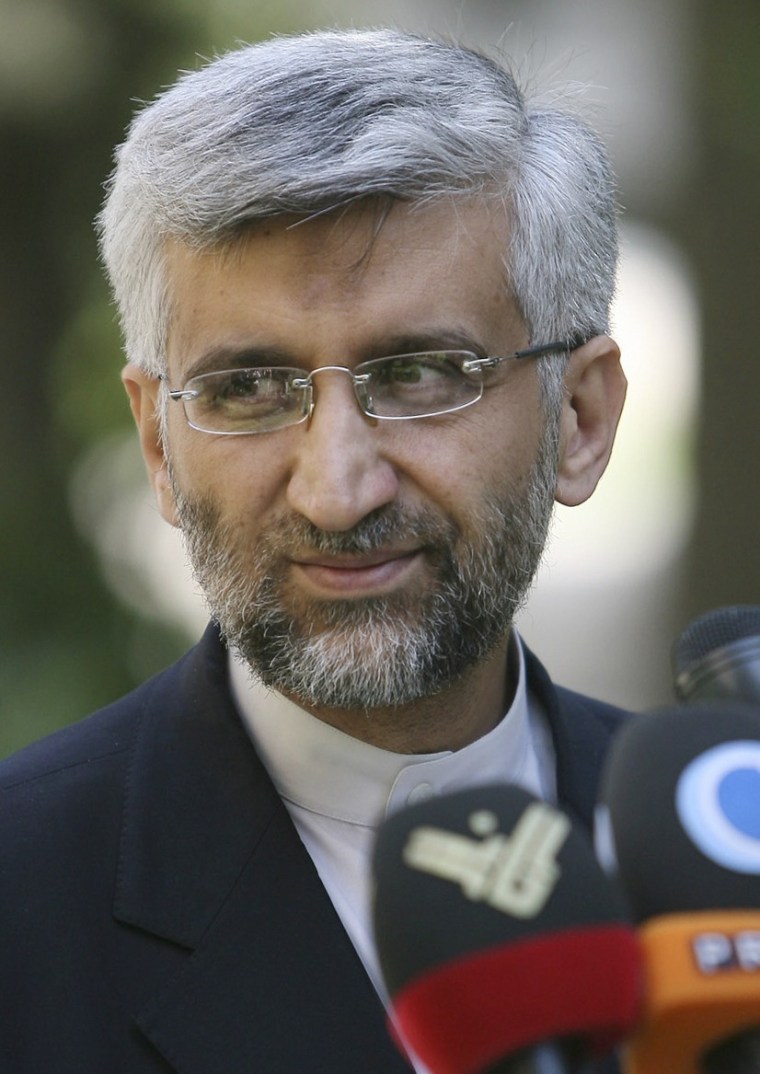Iran's top nuclear negotiator said his country is ready to hold talks with world powers to ease fears over its nuclear activities and has prepared a revised package of proposals for Western countries, state TV reported Tuesday.
Despite the suggestion of possible international cooperation, parliament sent a defiant message to the world by supporting President Mahmoud Ahmadinejad's nominee for defense minister, who is under an international arrest warrant for the 1994 bombing of a Jewish center in Argentina that killed 85 people.
Nuclear negotiator Saeed Jalili told reporters of the country's new proposals a day before a meeting in Germany of the six countries trying to address concerns about Iran's nuclear program — the U.S., France, Britain, Russia, China and Germany.
"Iran has prepared to present its revised package of proposals ... and is ready to hold talks with world powers ... in order to ease common concerns in the international arena," state TV quoted Jalili as telling reporters.
The U.S. has given Iran a deadline of the end of September to take up an offer of nuclear talks with six world powers and enjoy trade incentives should it suspend uranium enrichment activities. If not, Iran could face harsher sanctions.
But the content of Tehran's proposal, and to what extent it addresses the six powers' concerns, was not immediately clear.
Ruse to buy time?
The official IRNA news agency also said Iran was ready to present a package, but it did not refer to the nuclear dispute.
"Justice, development and peace in the international scene are the main goals ... in the proposed package," it quoted Jalili as saying.
Such language may spark suspicions in Western capitals that the Iran's proposal, like others before, fails to specifically address their concerns about its nuclear ambitions and is a ruse to buy time and avert the threat of more punitive measures.
"We've seen the reports, though we have not heard anything conclusively from the Iranians on that," White House spokesman Robert Gibbs said.
Iran has repeatedly rejected demands to halt uranium enrichment, which can have both military or civilian purposes, or even freeze it at current levels of output.
The U.S. and its European allies want to draw Iran back into negotiations over its nuclear program. At the G-8 summit in Italy in July, President Barack Obama said there was a September "time frame" for Iran to respond to offers to discuss its nuclear program.
Of Obama's offer of talks, Gibbs said: "It's still out there, it is still waiting for a response."
'Common ground'
The five permanent members of the U.N. Security Council plus Germany offered Iran a modified package of economic incentives June last year in return for suspending its uranium enrichment activities or face harsher sanctions.
Iran has repeatedly vowed it will never suspend enrichment work but said the incentives package has some "common ground" with Tehran's own proposals for a resolution to the standoff.
The U.S. accuses Iran of using its civilian nuclear program as a cover to develop nuclear weapons and wants it to stop enriching uranium, a process used to produce fuel for reactors that can also be a pathway to weapons production. Iran has denied the accusations, saying its nuclear is peaceful and is aimed at generating electricity, not bombs.
Ahmadinejad, whose disputed June 12 re-election prompted deadly street protests, referred in April to a package to be presented to the West.
An International Atomic Energy Agency report last week said Iran again ignored U.N. Security Council demands that it stop enriching uranium and open up to IAEA investigators "to exclude the possibility of military dimensions" to its nuclear activity.
Washington and its allies may target Iran's gasoline imports in a possible fourth round of sanctions. That could hurt Iran, which although it is the world's number five oil exporter, imports up to 40 percent of its gasoline.
Also Tuesday, the conservative-dominated parliament showed its support for Ahmadinejad's nominee for defense minister, Gen. Ahmad Vahidi. He is wanted by Argentina in the bombing of a Jewish cultural center in Buenos Aires.
His nomination has already drawn an outcry from Argentina and Jewish groups. But Iranian lawmakers hailed him as a hero with cries of "Death to Israel" as he addressed the chamber Tuesday. The support raises the likelihood Vahidi will be confirmed as defense chief when parliament votes on the entire Cabinet list on Wednesday.
Vahidi is one of five prominent Iranians sought by Argentina in the bombing, which killed 85 people. He was the commander of a special unit of Iran's Revolutionary Guard known as the Quds Force at the time of the attack.
More on: Iran
